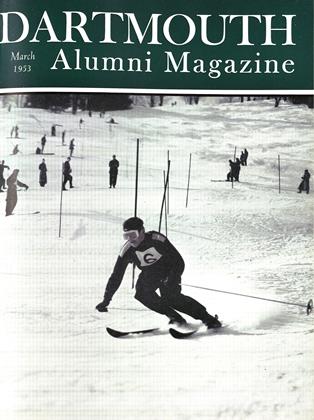Dwdwnaw of intellectual freedom and of the American college as "a free market place for the evaluation and exchange of ideas" was voiced on the Dartmouth campus also by a group of college and university trustees who gathered last month for a panel discussion that was part of the annual conference of the New England district of the American College Public Relations Association.
The trustees, speaking as individuals and not as official representatives of their institutions, were unanimously opposed to any indiscriminate investigation of higher education by a Congressional committee and expressed the view that grave harm would come of the type of investigation now apparently contemplated by Congressional chairmen. In this stand they gave no support to the American Association of Colleges, which in January went on record as "welcoming a Congressional investigation."
Grenville Clark, distinguished former member of the Harvard Corporation, told the 100 delegates to the conference, "Congress has no constitutional power to impose conditions on what books should be used, what contracts written with what professors, or any condition of what shall or shall not be taught. We ought to resist any such investigation as firmly as possible.
"What is needed at this time is a carefully worded statement saying that colleges and universities have nothing to hide, and that they are fully competent to handle their own affairs."
Other members of the trustees' panel were Bishop Lewis O. Hartman, trustee of Boston University; Maurice E. Witmer, trustee of Colby Junior College; Egbert C. Hadley, chairman of the board of trustees of Middlebury College; Miss Charlotte Ford, trustee of Simmons College; and Mrs. Hazel Wills and Frederick P. Smith, trustees of the University of Vermont.
The following day, as principal speaker at a luncheon session, Francis H. Horn '30, executive secretary of the Association for Higher Education, warned against a "subtle, creeping paralysis of freedom of thought and action" on college campuses. "Unless the intimidation of professors is halted and there is considerable evidence that professors are increasingly afraid to speak out on controversial issues the greatness of our institutions of higher education is doomed. Instead of moving forward to achieve the tremendous opportunities open to them, the colleges and universities will be but shadows of what they have been in the past as a result of their courageous and devoted search for truth and the advancement of knowledge."
The conference delegates themselves had a chance to take a stand for academic freedom when they adopted the following resolution:
As educational institutions we exist under state charters, depend in part on public support, and are tax-exempt. We recognize the right of legally constituted and properly conducted examination, but we condemn investigations based on unfounded rumor or halftruths or designed for publicity-seeking as improper examination which can do irreparable harm. We commend those colleges which have already, through their presidents and trustees, clarified their own positions about the nature of their obligations to society and are affirming their dedication to the integrity of free inquiry, the historic American right of dissent, and the right of every individual to due process of law.
Another topic of major concern at the ACPRA conference was educational television. A dinner address on this subject was delivered by Edward Lamb '24 of Toledo, publisher of The Erie (Pa.) Dispatch and owner of television stations in Ohio and Pennsylvania. Pointing out the urgent need for speed in making decisions about the 249 TV channels reserved for educational purposes until June, Mr. Lamb declared that "it would be an almost traitorous violation of our obligations to future generations if these channels are not utilized by non-commercial users."
With regard to the problem of the tremendous cost of television, Mr. Lamb recognized the fact that most colleges could participate in educational television only through some cooperative venture. The easiest way to get such an undertaking started, he declared, is to organize a nonprofit educational corporation, in support of which foundations, industry, and the general public could be solicited to add funds to those that the cooperating colleges could provide.
 View Full Issue
View Full Issue
More From This Issue
-
 Class Notes
Class Notes1929
March 1953 By F. WILLIAM ANDRES, EDWIN C. CHINLUND -
 Class Notes
Class Notes1918
March 1953 By ERNEST H. EARLEY, DONALD L. BARR -
 Article
ArticleEducation for What?
March 1953 By CHARLES LEONARD STONE '17 -
 Article
ArticleThe Responsibility of Management
March 1953 By CLARENCE B. RANDALL -
 Article
ArticleHome Thoughts On Europe
March 1953 By FRANCIS R. DRURY JR. 48 -
 Class Notes
Class Notes1920
March 1953 By RICHARD M. PEARSON, ROSCOE O. ELLIOTT
Article
-
 Article
ArticleTHE SENIORS WAITING FOR THE COMMENCEMENT PROCESSION
June, 1915 -
 Article
ArticleAlumni Club Luncheons
May 1949 -
 Article
ArticleWhere Editors End Up
OCTOBER 1989 -
 Article
ArticleThe Dartmouth Trustee Election
Sept/Oct 2007 -
 Article
ArticleThe Faculty
January 1955 By HAROLD L. BOND '42 -
 Article
ArticleClassic Boatman
April 1981 By M.B.R


